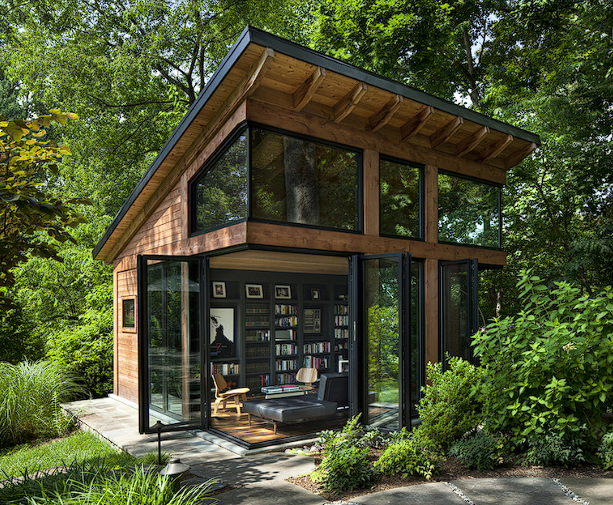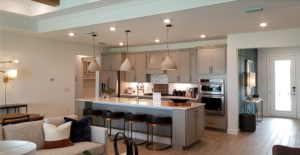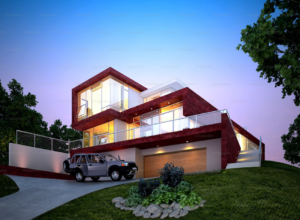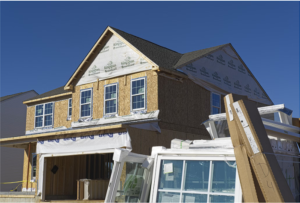Table of Contents
ToggleIn Sunnyvale, Accessory Dwelling Units (ADUs) are becoming increasingly popular as homeowners seek to maximize their property’s potential. This guide provides comprehensive information on ADUs in Sunnyvale, covering everything from regulations to costs and planning considerations.
What is an ADU?
An Accessory Dwelling Unit is a secondary housing unit on a single-family residential lot. ADUs serve to provide independent living facilities for one or more persons.
People also refer to them as granny flats, in-law units, second units, or casitas, and they usually have living and sleeping areas, a kitchen, and, in most cases, their own bathroom.
ADUs offer homeowners the flexibility to accommodate extended family members, generate rental income, or address housing shortages in their communities.
If you’re considering building an ADU in Sunnyvale, Valley Boutique Builders can help bring your vision to life. With our expertise in ADU construction, we can guide you through the process and ensure that your ADU meets your needs and preferences while adhering to regulations.
Types of ADUs
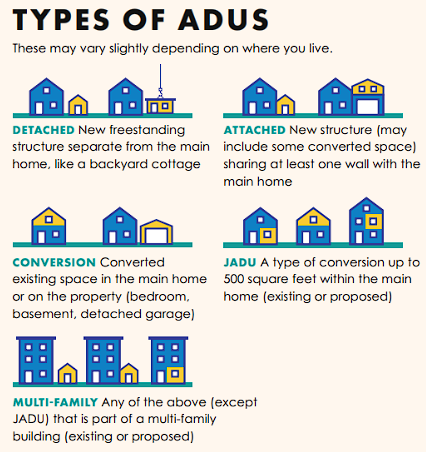
The types of Accessory Dwelling Units (ADUs) include:
- Detached ADUs: These are standalone structures separate from the primary residence.
- Attached ADUs: These are units connected to the primary residence, such as additions or conversions of existing space.
- Conversion ADUs: These are created by converting existing space within the primary residence, such as a garage, basement, or attic.
- Junior ADUs (JADUs): These are smaller units created within the primary residence, typically limited to a specific square footage, and may share facilities with the primary home.
Benefits of ADU in Sunnyvale
With Sunnyvale experiencing a housing crisis, building an Accessory Dwelling Unit (ADU) offers numerous benefits to both homeowners and the community:
- Rental income: Renting out the ADU can generate additional income for homeowners, which is particularly valuable in a high-demand housing market like Sunnyvale.
- Increased property value: Adding an ADU can enhance the overall value of the property, contributing to neighborhood stability and economic growth.
- Multigenerational living: ADUs provide a solution to accommodate extended family members or caregivers, addressing the need for affordable housing options for diverse household compositions.
- Housing flexibility: ADUs help alleviate the housing shortage by providing additional housing units within existing neighborhoods, supporting inclusive and sustainable community development.
- Aging in place: ADUs enable aging homeowners to downsize into a more manageable living space while remaining connected to their community, fostering aging in place and social cohesion.
- Sustainable living: ADUs promote sustainable urban development by utilizing existing infrastructure more efficiently, reducing the environmental impact of new construction, and encouraging transit-oriented living.
- Community integration: ADUs contribute to the vibrancy of neighborhoods by accommodating a diverse population, fostering social interaction, and enhancing community resilience.
- Home office or studio space: ADUs offer versatile living spaces that can serve as home offices, creative studios, or guest accommodations, supporting remote work and creative entrepreneurship.
In summary, building an ADU in Sunnyvale presents an opportunity to address the housing crisis while providing homeowners with financial benefits, housing flexibility, and opportunities for sustainable living.
ADUs can increase your home’s value by 35% and increase your living space up to 50%.
Sunnyvale Accessory Dwelling Units: Everything You Need to Know
If you’re considering building an ADU in Sunnyvale, now is the perfect time to start. But before you hire a general contractor, begin by exploring different ADU designs and floor plans, which you can find on the City of Sunnyvale’s website or through other sources like design magazines and neighborhood examples.
Understand your property’s specifics, including its Assessor Parcel Number (APN), lot size, and zoning regulations. Familiarize yourself with Sunnyvale’s ADU rules, covering aspects like size limits, setback requirements, and parking regulations. These may differ from the regulations in San Jose, or other Bay Area cities.
Engage with city staff to clarify how these rules apply to your project and adjust your budget accordingly. Ensure you have a solid financing plan in place that aligns with both your project’s needs and Sunnyvale’s requirements.
Once you’re prepared, you can proceed with applying for a permit confidently.
Sunnyvale ADU Permits
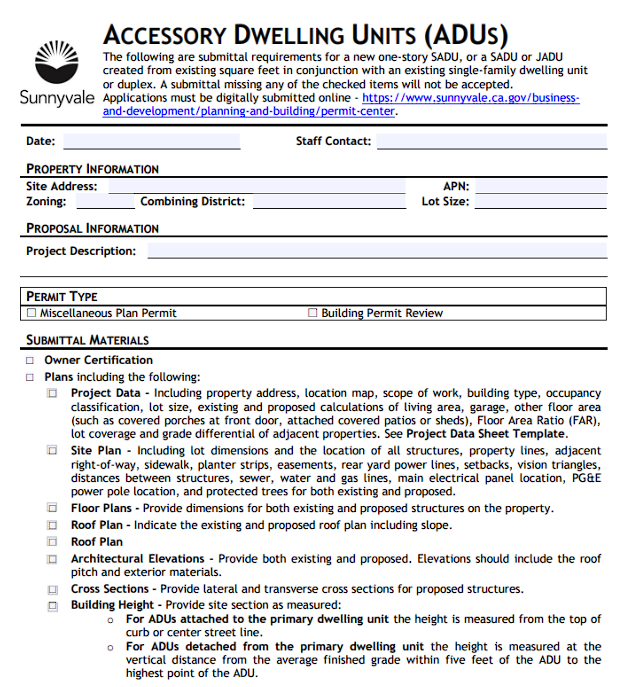
Navigating the planning permit application process for your ADU project involves several key steps:
- Initial review with the Planning Department: It’s a good idea to meet with the city’s planning staff about your project. Contact them at planning@sunnyvale.ca.gov, (408) 730-7440, or by visiting the One-Stop Permit Center online.
- Building permit application: Submitting a building permit application is easy in Sunnyvale, as community members can apply for all permits online via the One-Stop Permit Center. Upon submission, city staff will review the application for completeness. A complete application contains all required materials and details. Then, other relevant departments and agencies make their reviews. According to state law, cities, utilities, and special districts typically have 60 days after deeming an application complete to conduct their review, although many cities expedite this process. Denied applications receive comprehensive feedback detailing the incorrect items for remediation.
- Public hearings (if applicable): While most ADUs do not necessitate public hearings, exceptions arise for projects that deviate from standard rules, such as exceeding size or height limits or requiring special permits. In such cases, additional review processes may be necessary.
Understanding the legal construction process is crucial for navigating the planning permit application process smoothly. Engaging with city staff, staying informed about local regulations, and seeking clarification when needed can help facilitate a successful application process for your ADU project.
With our extensive experience as Bay Area ADU contractors, Valley Boutique Builders navigates the complexities of local regulations and building codes, ensuring compliance with the California Building Code and the San Jose Municipal Code.
Our team guides you through the permit application process, ensuring all necessary documentation and requirements are met to obtain the required permits.
Start working with Valley Boutique Builders
Sunnyvale ADU Costs & Fees
There are a number of fees involved in the building of an ADU in Sunnyvale.
Building Permit Fees
- Permit issuance: $38.00 (Applicable to each building project issued)
- Technology surcharge: 5% of permit fee (Applicable to each building project issued)
- Building permit: the fee varies based on the valuation of the project. Refer to the Building Permit Fee Table for exact amounts.
- Other building division fees vary based on your project needs. These include services like re-roofing, photovoltaic/solar systems, mechanical, electrical, plumbing permits, grading permits, sign permits, demolition permits, plan checks, energy plan check, fire prevention permits, construction tax, general plan maintenance, and more. The fees for each of these are also outlined in the above-referenced building permit fee table.
Planning Division Fees
Fees exist for different levels of review. Refer to the detailed Planning Division fee schedule for exact amounts. They include:
- Staff level reviews
- Telecommunication facilities
- Noticing fees
- Fees related to public hearings, including, zoning administrator reviews, appeals fees, development agreements, planning commission reviews, public works planning application review, and city council reviews.
- Environmental review
- Mitigation and Impact fees
- Location-specific fees, including the Perry Park specific plan, El Camino Real specific plan, Lawrence Station area plan, heritage preservation reviews, and the Moffett Park specific Plan
It’s important to note that the specific fees applicable to your ADU project may vary based on factors such as project valuation, size, complexity, and any exemptions or waivers that may apply. It’s recommended to consult with the Sunnyvale Building and Planning Division to get an accurate estimation of all costs and fees relevant to your ADU project.
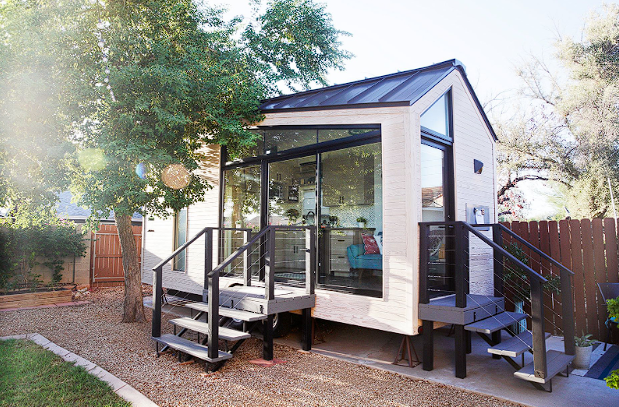
Sunnyvale Zoning Requirements
The City of Sunnyvale Code of Ordinance outlines requirements for ADUs. Here’s what they share:
- Purpose: the City of Sunnyvale encourages ADUs to address the housing shortage, and compliant units do not exceed the allowable density for the lot.
- Building requirements: ADUs must comply with applicable building codes, with exemptions as outlined in Chapter 16.72 of the municipal code.
- Design: The exterior appearance of ADUs should match the primary structure.
- Entrances: ADUs must have independent exterior access from the main dwelling.
- Parking: ADUs do not require off-street parking, and there is no need to replace covered parking spaces.
- Subdivisions: ADUs cannot facilitate property subdivisions.
- Sale and rental: Owners can rent ADUs separately but cannot sell them separately from the primary dwelling.
- Correction of nonconforming conditions: Approval should not be dependent on correcting nonconforming zoning conditions, as long as they do not pose a threat to public health and safety.
- Owner occupancy: Owner occupancy requirements apply to junior ADUs and certain standard ADUs.
- Utility connections: Some ADUs may require new utility connections, subject to proportional fees.
- Impact fees: Impact fees may be imposed based on ADU size, but exemptions apply to ADUs under 750 square feet.
These requirements aim to facilitate the development of ADUs while ensuring they meet certain standards for safety, design, and impact on infrastructure.
Sunnyvale Setback Requirements
In Sunnyvale, setback requirements for Accessory Dwelling Units (ADUs) vary depending on the type and location of the unit. A setback is the required distance between a building or structure and the property line or another designated area where construction is not permitted.
Your general contractor will be familiar with these requirements, but you should be, too:
- Detached ADUs: Minimum four-foot side and rear yard setbacks are required. Setbacks of less than four feet are allowed if the ADU is constructed in the same location and to the same dimensions as an existing structure that is demolished for the purpose of constructing the ADU.
- Attached ADUs: Attached ADUs must comply with setback requirements applicable to the primary dwelling unit. An ADU may be located on the second floor of a newly constructed or expanded single-family dwelling, provided it meets all requirements of the code applicable to second-story construction or additions, including setbacks and solar shading.
- Interior Space ADUs: Setbacks for ADUs located within the interior space of existing structures are not explicitly specified but must comply with building standards for dwellings.
These setback requirements are designed to ensure that ADUs are appropriately situated on the lot and maintain an adequate distance from property lines and neighboring structures for safety and privacy reasons.
Sunnyvale ADU Regulations & Ordinances
The City of Sunnyvale Code of Ordinance outlines its regulations and ordinances. While most local construction companies will be familiar with these ordinances, it’s important for the homeowner to be familiar with them.
Chapter 19.18 of the municipal code covers zoning regulations, while Chapter 19.79 focuses on Accessory Dwelling Units.
ADU Sizes
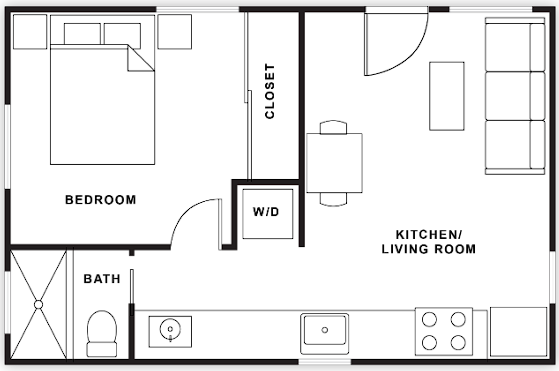
In Sunnyvale, the regulations for Accessory Dwelling Units (ADUs) dictate specific guidelines concerning their height, size, and lot size requirements.
ADU Height
For detached ADUs, the maximum allowable height is capped at 16 feet. Meanwhile, attached ADUs must adhere to height regulations outlined in the Sunnyvale Municipal Code and Design Review standards. The measurement for attached ADUs extends from the average finished grade within five feet of the accessory structure to the highest point of the accessory building.
ADU Size
Standard Accessory Dwelling Units (SADUs) can reach a maximum size of 850 square feet if they contain one bedroom, or 1,000 square feet if they house two or more bedrooms. Attached ADUs are further constrained and aren’t permitted to exceed 50% of the existing primary dwelling unit. Junior Accessory Dwelling Units (JADUs) are restricted to a maximum size of 500 square feet.
Lot Size
Typically, ADU regulations do not stipulate minimum lot size requirements. However, lot size regulations may vary based on underlying zoning ordinances and other factors delineated in the Sunnyvale Municipal Code.
Consult the complete Accessory Dwelling Unit Ordinance in Chapter 19.79 of the Sunnyvale Municipal Code, or contact the city’s planning staff for any explicit lot size provisions.
Owner-occupancy & ADU Rentals
In Sunnyvale, specific regulations govern the occupancy and rental of Accessory Dwelling Units (ADUs).
For Junior Accessory Dwelling Units (JADUs), an owner occupancy requirement mandates that the property owner resides in either the JADU or the primary dwelling. Before the issuance of a building permit for a JADU, the property owner must sign and record a deed restriction, affirming the property’s owner-occupied status as long as the JADU remains on the premises.
Additionally, ADUs are subject to rental restrictions, prohibiting their use as short-term rentals like Airbnb. Typically, they are intended for long-term rental housing.
Utility Connections
ADUs do not allow for new or separate utility connections. This means that ADUs typically share utilities such as water, electricity, and gas with the primary dwelling unit. Furthermore, there shouldn’t be any associated fees for new utility connections in the ADU.
Fire Safety
Typically, ADUs do not require fire sprinklers unless already mandated for the primary dwelling unit. Additionally, Junior Accessory Dwelling Units (JADUs) are not considered separate dwellings and thus are not subject to fire separation requirements for new units.
Parking
Generally, no new parking spaces are required for new ADUs. Moreover, replacement parking is not mandated when an existing garage is converted into an ADU. However, if parking is provided for the ADU, it must adhere to standards for development.
Additionally, a Traffic Impact Fee (TIF) may be required for ADUs that meet certain size thresholds, with the fee calculated proportionally to the size of the primary dwelling.
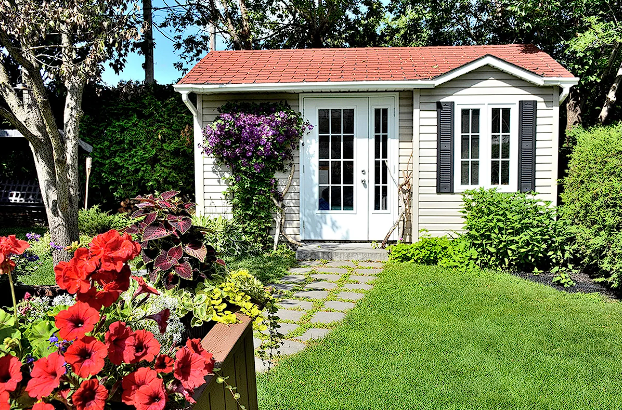
Start Building Your Dream Sunnyvale ADU
Ready to start building your dream ADU in Sunnyvale? With our expertise and guidance, navigating the ADU construction process will be a breeze. Maximize your property’s value and utility while contributing to the housing landscape of the region.
Contact Valley Boutique Builders today to turn your vision into reality.

